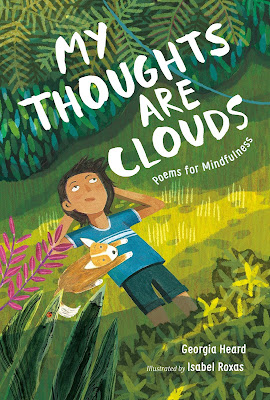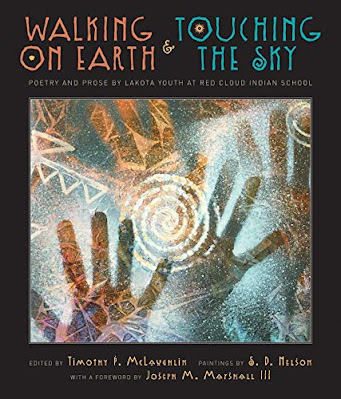Echo Echo: Reverso Poems About Greek Myths
Bibliography:
Singer, Marilyn. Echo Echo: Reverso Poems About Greek Myths. Ill. by Josée Masse. New York: Dial Books for Young Readers, 2016. ISBN: 978-0803739925
Summary:
In this collection of poems, Marilyn Singer briefly recounts twelve Greek myths using reverso poetry, atype of poem invented by Singer herself. After an introductory poem entitled “The Age of Marvelous Myths,” the poems tell the tales of Pandora, Arachne and Athena, King Midas, Perseus and Medusa, Narcissus and Echo, and more. Below each poem is a short synopsis of the myth--just enough to get the gist. The book concludes with a poem called “Gods and Mortals” followed by an author’s note sharing background information about Greek mythology and the unique style of reverso poetry.
Analysis:
If you’ve never heard of reverso poetry, it is a clever style of poem construction in which there are two versions of the same poem: one is read from top to bottom, and the second poem arranges the same lines in reverse order with only punctuation and capitalization changed. The second version can completely change the poem's meaning and point of view. In “Perseus and Medusa,” each character is hoping to behead the other. First, Perseus cries, “There is no man who wouldn’t be / scared stiff. / Petrified indeed, / I must have your head, stone-hearted monster!” In the reversed version, it is Medusa who speaks: “I am the chosen / stone-hearted monster. / I must have your head, / petrified indeed-- / scared stiff. / There is no man who wouldn’t be.” Punctuation proves to be extremely important in these poems, so readers should pay close attention when reading aloud.
Perhaps the most brilliant use of the reverso form in this book is the myth of Demeter and Persephone. When Hades, god of the underworld, falls in love with Persephone and kidnaps her, it enrages Persephone’s mother, Demeter, goddess of the earth’s bounty. Demeter threatens to strike the earth barren, so she and Hades agree to share Persephone six months at a time. While Persephone is in the underworld, the earth grows cold, creating winter, but when she returns to her mother, the earth springs to life in a vibrant summertime. Because of this duality, the reverso poem is an intriguing format for this myth. “No more flowers blooming, trees in leaf. / There will be six months of grief / after / so much joy and laughter.” In the reversed version, Persephone returns, and Demeter celebrates: “So much joy and laughter / after / six months of grief. / There will be / flowers blooming, trees in leaf.” This is also an example of the subtle rhyme Singer incorporates in her poetry, although none of the poems depend heavily on rhyme.
The brightly colored illustrations by Josée Masse ingeniously reflect the mirrored nature of Singer’s poetry by splitting each illustration down the middle with a vertical or horizontal axis, revealing some form of symmetry. Narcissus is reflected in the pond’s water, and Perseus and Medusa sneak up on each other in opposite versions of the same scene. The cover art features a Greek landscape in the daytime in the upper half, and upside-down below is the same scene at night, the architecture portrayed in perfect symmetry under a starry sky. Masse’s artwork, with its distinctly Greek color palette of cobalt blues and rich golds, almost steals the whole show and will certainly delight readers who are familiar or unfamiliar with the myths. Ages 6-9.
Excerpt:
“Demeter and Persphone”
I hate the thief
Do not ask that
I forgive Hades.
Spring
will turn to
winter,
will leave this land cold and dark.
Daughter,
this mother’s lonely
tears
shed no
relief.
I feel such despair.
No more
flowers blooming, trees in leaf.
There will be six months of grief
after
so much joy and laughter.
-----
So much joy and laughter
after six months of grief.
There will be
flowers blooming, trees in leaf.
No more
despair.
I feel such relief.
Shed no
tears.
This mother’s lonely
daughter
will leave this land, cold and dark.
Winter
will turn to
spring.
I forgive Hades.
Do not ask that
I hate the thief.
Activity:
- Read “Demeter and Persephone” aloud to students while showing them the text (on a projector or printed on a poster).
- Ask students if they notice anything strange about the two poems.
- After students share their observations, explain that this is a style of poetry called “reverso” invented by Marilyn Singer.
- Pair readers together to dramatize the different versions of the poem, reading and acting with great emotion.




Comments
Post a Comment